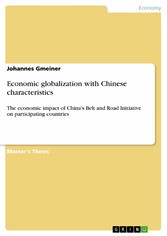Search and Find
Service
Economic globalization with Chinese characteristics - The economic impact of China's Belt and Road Initiative on participating countries
More of the content

Economic globalization with Chinese characteristics - The economic impact of China's Belt and Road Initiative on participating countries
Master's Thesis from the year 2017 in the subject Economics - International Economic Relations, grade: 1,7, University of Würzburg, language: English, abstract: In 2016, 'Belt and Road' was among the most frequently-used buzzwords in Chinese media, a term strongly correlated to the topics mentioned. The Belt and Road Initiative, formerly One Belt, One Road, symbolizes how the lion intends to shake the world. In his speech at the Word Economic Forum in Davos in January 2017, the leader of the Communist Party of China (CCP), Mr. Xi Jinping emphatically advocated a liberal economic globalisation, environmental sustainability and abolition of protectionism. According to him, China will be a spearhead in defending economic globalization and promoting global economic development and opening-up. At the end of his speech, the president referred to the Belt and Road Initiative (BRI) which was launched in 2013 and pursues the goals of fostering cooperation, economic development and prosperity for all participating countries in a win-win manner. This initiative aims at nothing less than connecting Asia with Africa and Europe by establishing far-spreading transport infrastructure networks via land and sea, fostering trade, boosting economic integration and increasing cultural exchange. Since its launch it has attracted much attention, especially concerning its political implications and obstacles. Besides these political discussions, figures of projects usually worth billions of dollars are circulating; yet, there are no papers examining the initiative based on economic theories and specifically focusing on the initiative's true capability to increase economic development in participating countries. The common assessment is that huge transport and other infrastructure projects are beneficial for developing countries as they may boost trade and economic growth. However, this simplistic assumption should not be accepted without evidence, as unproductive investments can have a huge negative impact on these economies; thus, this thesis will take a deeper look at the BRI's economic characteristics and compare them to economic development theories as well as theories about the correlation of economic growth and transport infrastructure investments. In this way, it intends to clarify the potential impact on participating countries' economic development.
All prices incl. VAT











